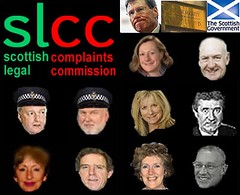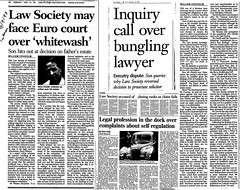 Consumer Focus Scotland helped Scots consumers on many issues, including access to justice. CONSUMER FOCUS SCOTLAND staff have been told by their Chairman Douglas Sinclair, the organisation will continue to make sure Scots consumers get a fair deal in both private markets & public services until the Westminster coalition’s very anti-consumer decision to scrap the organisation takes effect sometime in 2012. I previously reported on the UK Government’s decision to scrap Consumer Focus & Consumer Focus Scotland HERE & HERE.
Consumer Focus Scotland helped Scots consumers on many issues, including access to justice. CONSUMER FOCUS SCOTLAND staff have been told by their Chairman Douglas Sinclair, the organisation will continue to make sure Scots consumers get a fair deal in both private markets & public services until the Westminster coalition’s very anti-consumer decision to scrap the organisation takes effect sometime in 2012. I previously reported on the UK Government’s decision to scrap Consumer Focus & Consumer Focus Scotland HERE & HERE.
There is of course to be a “consultation” on the closure of Consumer Focus & Consumer Focus Scotland, details of which will follow in further reports, so there’s still time to try and save what is certainly a much needed voice for consumers all across the UK, and especially in Scotland.
Scots will also have a chance to voice their opinion at the ballot box next May 2011 on which Scottish political party is doing the most to protect Scots consumers, so use your vote wisely when the time comes, and make your voice heard against those who would strip us of much needed consumer protection, especially in these perilous times of financial hardship where a lack of consumer advocacy will assist those professions who seek to rip-off consumers when no one is around to do anything about it.
 Consumer Focus Scotland’s Chairman, Douglas Sinclair told his staff in a letter released to the media : “I am writing to you in the light of the announcement last week that the UK Government has decided to transfer Consumer Focus’ functions to Citizens Advice and Citizens Advice Scotland. Subject to the approval of the UK Parliament, it is proposed that the work of Consumer Focus Scotland will transfer to Citizens Advice Scotland in 2012, and at that point, it is planned that Consumer Focus will be abolished.”
Consumer Focus Scotland’s Chairman, Douglas Sinclair told his staff in a letter released to the media : “I am writing to you in the light of the announcement last week that the UK Government has decided to transfer Consumer Focus’ functions to Citizens Advice and Citizens Advice Scotland. Subject to the approval of the UK Parliament, it is proposed that the work of Consumer Focus Scotland will transfer to Citizens Advice Scotland in 2012, and at that point, it is planned that Consumer Focus will be abolished.”
“As it is expected that the necessary legislative measures, if passed by the UK Parliament, will not take effect until sometime in 2012, we will continue our work in making sure that consumers get a fair deal in both private markets and public services. We will be issuing a draft work plan for 2011/12 and look forward to working with you to deliver more benefits for consumers.”
“We will be working with the Scottish Government to ensure the best future management arrangements for the Scottish Government funded national development projects – healthy living award, Community Food and Health (Scotland), Scottish Accessible Information Forum and Health Rights Information Scotland. We will also continue to work with the Scottish Government on the planned transfer of Waterwatch Scotland’s advocacy powers to find a solution that works effectively for consumers.”
“I am immensely proud of everything which Consumer Focus Scotland, formed by the merger of the Scottish Consumer Council, Energywatch and Postwatch, has achieved in the first two years of its life, and of the legacy of over thirty years of work by these bodies in bringing about real benefits for consumers in Scotland. Consumer Focus and Consumer Focus Scotland have achieved a huge amount for consumers. Earlier this month, Consumer Focus obtained a £70 million energy bill refund for consumers across the UK.”
Consumer Focus Scotland’s achievements have included:
* Establishing the Scotland-based Extra Help Unit to support vulnerable consumers across Great Britain with their energy and post complaints. Since beginning work, the Extra Help Unit has dealt with thousands of complaints and enquiries and obtained over £1.4 million in compensation for vulnerable consumers.
* Following years of campaigning and influencing work, helping to secure the passage of the Legal Services (Scotland) Bill which will widen choice for users of legal services and increase access to justice.
* Securing the inclusion of a new duty on scrutiny bodies to continuously improve user focus in the Public Services Reform (Scotland) Act.
* Playing a key role in the establishment of the Post Office Challenge Fund for Scotland to support the development of Scotland’s post offices.
Considering some of their achievements, and their work as the former Scottish Consumer Council, they’ve done pretty well for us Scots, in many areas of consumer interest, particularly on issues relating to legal services, access to justice & regulation of the legal profession – my specialist areas of reporting. For what it costs to run Consumer Focus as an organisation, well, we’d be better saving it, than handing millions from the taxpayer over to those negligent bankers who have caused the cuts now facing public services & jobs in the UK.








